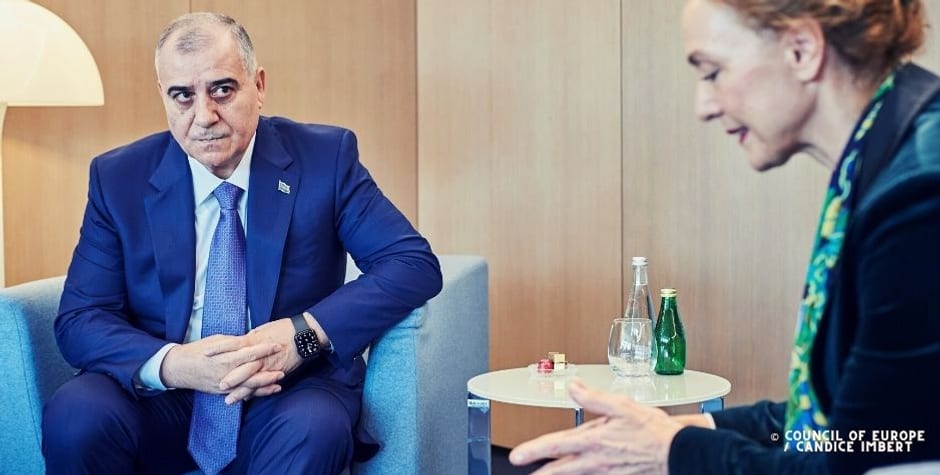

Azerbaijan Excluded from the Parliamentary Assembly of the Council of Europe
Azerbaijan Excluded from the PACE
The Parliamentary Assembly of the Council of Europe has officially suspended the delegation of Azerbaijan on 24 January 2024. While the ethnic cleansing of Armenians in the Nagorno-Karabakh region was undoubtedly the triggering factor for such a sanction, Azerbaijan has also demonstrated significant democratic dysfunction and a striking lack of cooperation.
Article initially published in Valeurs Actuelles. Photo: © Council of Europe / Candice Imbert, for informational and educational uses relating to the Council of Europe’s work. M. Ali Naghi oglu Naghiyev (Azerbaïdjan) & Marija Pejčinović Burić (CoE).
The delegation of Azerbaijan was denied the ratification of its credentials by the Parliamentary Assembly of the Council of Europe at the opening of its 2024 session, and this suspension will remain in effect until further notice. While Azerbaijan remains a full member of the Council of Europe, this action is an encouraging sign for the preservation of the Institution's credibility.
Indeed, more than 20 years after joining the Council of Europe, Azerbaijan has still not fulfilled its major obligations resulting from this membership. With the use of force to retake the Nagorno-Karabakh region in September 2023 and the ethnic cleansing of nearly all 120,000 Armenians, it had become impossible to tolerate the ignominy of Ilham Aliyev's regime any longer.
Azerbaijan is notoriously known for its disregard of the principles of pluralist democracy and the rule of law, as well as its failure to respect human rights and fundamental freedoms. The Assembly explicitly denounces these issues in its Resolution 2527 (2024): "Very serious concerns remain as to its ability to conduct free and fair elections, the separation of powers, the weakness of its legislature vis-à-vis the executive, the independence of the judiciary and respect for human rights."
The need to question the entire functioning of democratic institutions in Azerbaijan
The Assembly has raised regular concerns about the functioning of Azerbaijan's democratic institutions. Its "concerns" listed in Resolution 2184 (2017) are dizzying: "presidential oversight of the Prosecutor's office," "allegations of excessive use of pretrial detention, which should be the exception rather than the norm," "arbitrary application of criminal legislation to limit freedom of expression," more than 120 judgments of the European Court of Human Rights not implemented or only partially implemented in 2017 (285 in 2023), "repressive actions against independent media and advocates of freedom of expression," "internal supervision mechanism of the Ministry of the Interior," "allegations of torture and ill-treatment," "reports linking the Azerbaijani Government to a large-scale money-laundering scheme in place between 2012 and 2014, and used, inter alia, to influence the work of members of the Assembly as regards the human rights situation in Azerbaijan," "shortcomings in the NGO legislation," "systematic repression of human rights defenders, the media, and those critical of the government."
The European Center for Law and Justice (ECLJ) has been denouncing Azerbaijani corruption since 2017, which allows Ilham Aliyev to maintain his influence on the international stage and even within European Institutions. Aware of the "Azerbaijani Laundromat, through which US$2.9 billion were transferred out of Azerbaijan," the Assembly did no more than ask Azerbaijan to “investigate fully and effectively the money laundering” and to start an "independent and impartial inquiry into the allegations of corruption of Assembly members" in its Resolution 2279 (2019). How naive it would be to entrust a guilty of corruption with the task of investigating its own corruption.
Condemnation of the ethnic cleansing of Armenians in Nagorno-Karabakh
Europe, which has blindly tied itself to Azerbaijani gas in an attempt to sanction Russia, has thus stood by without taking action as Azerbaijan gradually recaptured Nagorno-Karabakh. Following the war in 2020, Azerbaijan, with the help of Turkey, regained 75% of the territory of the autonomous region of Nagorno-Karabakh. Armenians retained the right to pass through the Lachin corridor, which was under the control of Russian peacekeeping forces. The issue of Nagorno-Karabakh was remaining unresolved.
In December 2022, Azerbaijan imposed a blockade, starving and depriving of medicine the poverty-stricken population of Nagorno-Karabakh. The Parliamentary Assembly of the Council of Europe then demanded on June 22, 2023 that Azerbaijan restore free and safe access through the Lachin Corridor, "struck by the fact that its leadership does not acknowledge the very serious humanitarian and human rights consequences stemming from the present situation" (Resolution 2508 (2023)). Quite the opposite happened, as on September 19, 2023, Azerbaijan dealt the final blow to the autonomous republic.
On October 12, 2023, the Assembly "strongly condemns the military operation," and acknowledges a "tragic exodus of almost a whole population from its ancestral homeland," raising "allegations and reasonable suspicions that this amounts to ethnic cleansing" (Resolution 2517 (2023)). Above all, the Assembly states its readiness to request the initiation of a complementary joint procedure that could lead to the suspension of Azerbaijan from the Council of Europe and challenge the credentials of the Azerbaijani delegation to the Assembly during the first part of its 2024 session.
The European Centre for Law and Justice welcomes the suspension of the Azerbaijani delegation from the Parliamentary Assembly of the Council of Europe on January 24, 2024. In the same Resolution 2527 (2024), the Assembly, in addition to the tragedy of the Armenians of Nagorno-Karabakh, "strongly regrets that it has not been invited to observe the forthcoming presidential election [on February 7, 2024] despite Azerbaijan’s obligation to send such an invitation as the country is under monitoring procedure." The ECLJ reiterates its invitation to the Assembly to request the suspension or even the exclusion of Azerbaijan from the Council of Europe, as it had undertaken to consider.
SIGNATURES













